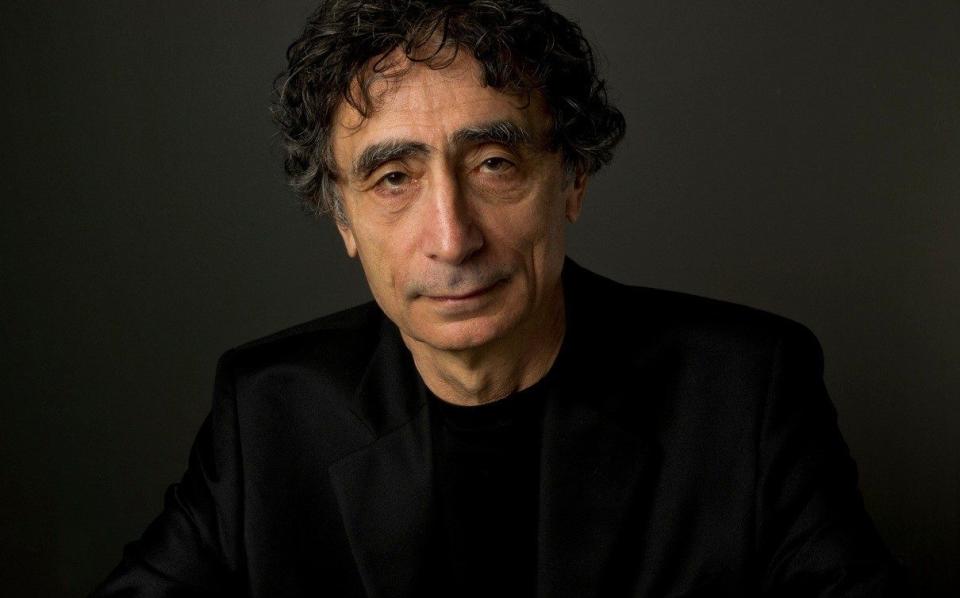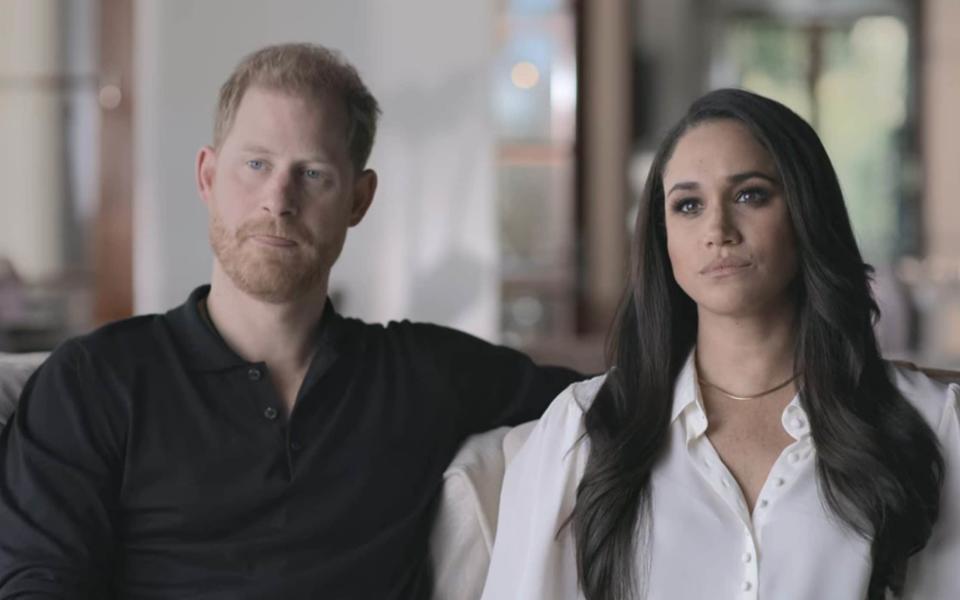What happened when I met Prince Harry’s ‘trauma expert’

Prince Harry has decided to submit himself to a live streamed conversation with the trauma expert Gabor Maté, and if anyone is wondering what, exactly, to expect from this surprise pairing, then pull up a chair and let me tell you. Because six months ago, I too had the opportunity to have a one on one with Dr Maté, when he came on my podcast, Mad World, to discuss his latest book, The Myth Of Normal. It would be fair to say that my conversation didn’t attract quite as much attention as this one, which is expected to be watched by a worldwide audience of many hundreds of thousands, but it has given me some idea of what Harry can expect when he sits down to chat to the eminent Canadian physician on Saturday afternoon.
Firstly, let us disabuse ourselves of the notion that the Duke of Sussex will be the one in charge here. Harry may be a senior royal, but in the fields of recovery and psychotherapy, Maté is king (when I interviewed the Duke in January at his home in Montecito, we spoke excitedly about Maté for some time). He has been awarded the Order of Canada for his medical work and writing on addiction, is a New York Times bestselling author many times over, and has over a million followers on social media. The 79-year-old, who began his career as a GP in Vancouver, is so sought after that when I told friends I was meeting him, they reacted as if I had just announced I was going on a date with Brad Pitt.
It felt as exciting as that. The moment I met Maté, I mumbled shyly that, as a recovering addict, this was a bit like meeting Father Christmas. His intense gaze didn’t falter. “You’re not an addict,” he said, seriously. “Nobody is that dysfunctional. You may have drunk in a way that was harmful to you and your emotional life and maybe even your physiology, but that doesn’t mean that’s who you are. It just means that’s something you did and you did it for a reason. What did it give you?”
“Oblivion,” I whispered.
“And why would someone want oblivion?” he continued, very matter-of-factly.
“From pain?” I suggested.
“Yeah. And is pain relief a good thing or a bad thing? Addiction wasn’t your problem, it was your attempt to solve the problem of pain. It is a pain response. And it is totally normal to escape from pain [with addiction] when you know no other way.”
There, in one short conversation, Maté had succinctly and unemotionally summed up the teachings of several very expensive months in rehab.
It’s not for everyone, of course. His politics, too, which are slightly to the left of Fidel Castro, have raised eyebrows. He has compared Hamas to Warsaw ghetto fighters.
But there is no denying that when it comes to mental health and psychotherapy, he knows what he is talking about. If you haven’t heard of him, it’s probably because you are fortunate enough not to have encountered addiction, ADHD or social media, where people quote him only marginally less than Aristotle or Shakespeare. Unlike most people lauded on Instagram, however, his work comes backed with years of medical expertise and scientific research. He ran a family doctor’s practice for 20 years in Vancouver, before having, like the Duke, a sort of mid-life awakening. Married with young children, he found he was “quite a lost person”. “I was depressed and irritable and had marriage problems and difficulties with my kids,” he told me. “Like Dante, I had to go through hell to find redemption. I had to descend into the darkness of my soul and my own traumas to figure out what the hell got me off the path.”
Maté was born in Nazi-occupied Hungary in 1944, and his maternal grandparents were killed in Auschwitz when he was only five months old. At the age of one, he was separated from his mother as she tried to keep him safe – he wondered if that separation, and the profound lack of safety in his early years, led to his issues later in life. “And then, furthermore, as a family physician, I couldn’t help but notice that people had traumas in their lives and those traumas related to their physical or mental health condition. Nothing in medical school training prepares you for that, but if your eyes are open, you see it. And as a family physician, you really have an advantage. You really get to know people. You have been trained to deal with particular body organs, but you get to know the whole person in the context of their lives.”

He went to work with drug addicts in downtown Vancouver, which has some of the highest use of narcotics on the planet. He quickly discovered that alongside all manner of physical illnesses such as HIV, his patients were also severely traumatised – every single one of his female patients had been sexually abused at some point in their lives. What he found led him to write his first book, In the Realm of Hungry Ghosts, which turned on its head everything society believed about addicts at the time. Maté did not believe that these people were experiencing a moral failing, or that they had a disease. Instead, he saw addiction as a maladaptation that some humans use to soothe trauma experienced as a child.
That word – trauma – is one that leaves many people rolling their eyes in despair at a so-called “woke” culture that seems intent on making everyone feel like victims. But Maté is actually stunningly unsentimental about trauma, and does not subscribe to a culture of blame – trauma, he says, is not something that happens to you, but something that happens inside of you, and when we ignore the mind-body connection, we lose the opportunity to vastly improve public health. “When you actually look at the meaning of the word trauma,” he told me, “it means a wound. You can be psychologically wounded by war, or a tsunami. You can certainly be wounded if you’re abused sexually, physically and emotionally. But you can also be wounded by not having your needs met as a young child. Infants are born with certain needs, and if they are not met, that will distort their development.”
There are, Maté points out, a million and one reasons a child might not get their needs met, most of them nobody’s fault – the parent may be depressed, or has to go to work, or is unconsciously passing down the wounds they themselves were left with from their own childhoods.
In times gone by, when we lived more connected lives, these needs might have been met by the wider community. But modern life, with its lack of supportive childcare and its obsession with power, work and technology, has meant that more and more children are, through no real fault of their parents, not getting their needs met, causing multiple “maladaptations”, such as addiction and ADHD. As he writes in The Myth of Normal: “A society that fails to value communality – our need to belong, to care for one another, and to feel caring energy flowing toward us – is a society facing away from the essence of what it means to be human. Pathology cannot but ensue. To say so is not a moral assertion but an objective assessment.”
But Maté, for all his talk of trauma, is not a soft touch, and nor does he mince his words. He does not think that people should wallow in these traumas, and nor does he think it is helpful to become resentful about them. Instead, he believes that it is only by facing our commonplace traumas that we are able to move forward and be useful members of society, ones resilient enough to not need safe spaces or trigger warnings.

It will be interesting to see how his conversation with the Duke plays out – perhaps, just perhaps, it might even provide the healing opportunity that everyone hopes will take place ahead of the King’s Coronation in May.
For as Maté himself says in the final paragraphs of The Myth of Normal: “We are blessed with a momentous opportunity. Shedding toxic myths of disconnection from ourselves, from one another, and from the planet, we can bring what is normal and what is natural, bit by bit, closer together. It is a task for the ages: one that can redeem the past, inspire the present, and point to a brighter, healthier future. It is our most daunting challenge and greatest possibility.”
Gabor Maté spoke to Bryony Gordon for a special edition of her mental health podcast Mad World, to mark Addiction Awareness Week. Listen to the full interview for free using the player within this article, or on Apple Podcasts, Spotify or your preferred podcast app.
The Myth of Normal: Trauma, Illness & Healing in a Toxic Culture by Gabor Maté with Daniel Maté is available from Telegraph Books for £25. Call 0844 871 1515 or visit books.telegraph.co.uk

 Yahoo News
Yahoo News 
